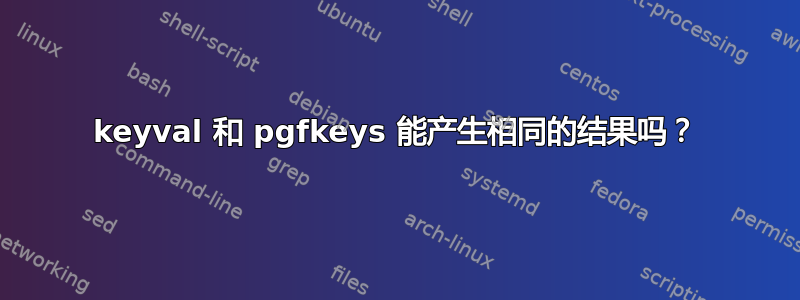
我花了大约五个小时(!)学习如何创建带有键值的命令?(和其他资源)并试图理解如何实现键值,这非常令人困惑。我编写了一个本质上很简单的测试用例(至少对这里的大多数人来说)并且有一些我无法解释的不一致之处。
这是使用 的 MWE keyval。
% !TEX TS-program = lualatexmk
% !TEX encoding = UTF-8 Unicode
\documentclass{article}
\usepackage{keyval}
\makeatletter
% Key definitions
\define@key{sayhello}{towhom}{\def\sh@towhom{#1}}
% Key defaults
\setkeys{sayhello}{towhom=Michael}
% Define the command that uses the key
\newcommand{\sayhello}[2][]{%
%\begingroup% localizes the new settings w/o calling the defaults
\setkeys{sayhello}{towhom=Michael} % Reset defaults w/o localizing
\setkeys{sayhello}{#1} % Set new keys
Say hello to \sh@towhom\ #2.
%\endgroup%
}%
\makeatother
\begin{document}
\sayhello{tomorrow}
%\sayhello[towhom]{today} % throws no value specified for towhom
\sayhello[towhom=Jill]{tomorrow}
%\sayhello[towhom]{today} % throws no value specified for towhom
\sayhello[towhom=Joe]{tomorrow}
%\sayhello[towhom]{tomorrow} % throws no value specified for towhom
\sayhello{today}
\end{document}
这里是使用 的 MWE pgfkeys。
% !TEX TS-program = lualatexmk
% !TEX encoding = UTF-8 Unicode
\documentclass{article}
\usepackage{pgfkeys}
\pgfkeys{%
/sayhello/.is family, /sayhello,
towhom/.default=Michael,
towhom/.store in=\sayto
}%
\newcommand*{\sayhello}[2][]{%
\pgfkeys{/sayhello,#1}
Say hello to \sayto\ #2.
}%
\begin{document}
%\sayhello{tomorrow} % throws undefined control sequence
\sayhello[towhom]{today}
\sayhello[towhom=Jill]{tomorrow}
\sayhello[towhom]{today}
\sayhello[towhom=Joe]{tomorrow}
\sayhello[towhom]{tomorrow}
\sayhello{today} % works perfectly
\end{document}
我希望这两种实现都能得到相同的结果。但事实并非如此。keyval似乎不喜欢指定没有值的键。pgfkeys当没有给出任何选项时,其行为不一致,但当keyval没有给出任何选项时,其行为完美。我的例子编码错误了吗?不一致的行为是预期的行为吗?我完全糊涂了。
答案1
您混淆了初始值和默认值。如果您使用键而不提供值,则使用第二个值。除此之外,如果您使用命令来存储键值,最好先用 定义它\newcommand,因为这将避免您覆盖现有命令。
我个人觉得这pgfkeys更令人困惑,因为使用相同的命令来定义和设置键,并且理解某些处理程序的行为并不总是那么容易,例如pgfkeys 密钥处理程序 .get 和 .store 起什么作用?。
\documentclass{article}
\usepackage{keyval}
\makeatletter
\newcommand\sh@towhom{}
\define@key{sayhello}{towhom}[Default]{\def\sh@towhom{#1}}
\setkeys{sayhello}{towhom=Initial}
\newcommand{\sayhello}[2][]{%
\begingroup
\setkeys{sayhello}{#1} % Set new keys
keyval, say hello to \sh@towhom\ #2.
\endgroup%
}%
\makeatother
\usepackage{pgfkeys}
\newcommand\sayto{}
\pgfkeys{%
/sayhello/.is family, /sayhello,
towhom/.store in=\sayto,
towhom/.default=Default,
towhom = Initial,
}%
\newcommand*{\sayhellopgf}[2][]{%
\begingroup
\pgfkeys{/sayhello,#1}%
pgfkeys, say hello to \sayto\ #2.
\endgroup
}%
\ExplSyntaxOn
\tl_new:N \l_sayhello_towhom_tl
\keys_define:nn {sayhello}
{
towhom .tl_set:N = \l_sayhello_towhom_tl,
towhom .initial:n = Initial,
towhom .default:n = Default
}
\NewDocumentCommand\sayhelloexpl{O{}m}
{
\group_begin:
\keys_set:nn{sayhello}{#1}
l3keys,~say~hello~to~\l_sayhello_towhom_tl\c_space_tl#2
\group_end:
}
\ExplSyntaxOff
\begin{document}
\sayhello{tomorrow}
\sayhello[towhom]{today}
\sayhello[towhom=Jill]{tomorrow}
\sayhello[towhom]{today}
\sayhello[towhom=Joe]{tomorrow}
\sayhello[towhom]{tomorrow}
\sayhello{today}
\sayhellopgf{tomorrow}
\sayhellopgf[towhom]{today}
\sayhellopgf[towhom=Jill]{tomorrow}
\sayhellopgf[towhom]{today}
\sayhellopgf[towhom=Joe]{tomorrow}
\sayhellopgf[towhom]{tomorrow}
\sayhellopgf{today}
\sayhelloexpl{tomorrow}
\sayhelloexpl[towhom]{today}
\sayhelloexpl[towhom=Jill]{tomorrow}
\sayhelloexpl[towhom]{today}
\sayhelloexpl[towhom=Joe]{tomorrow}
\sayhelloexpl[towhom]{tomorrow}
\sayhelloexpl{today}
\end{document}



